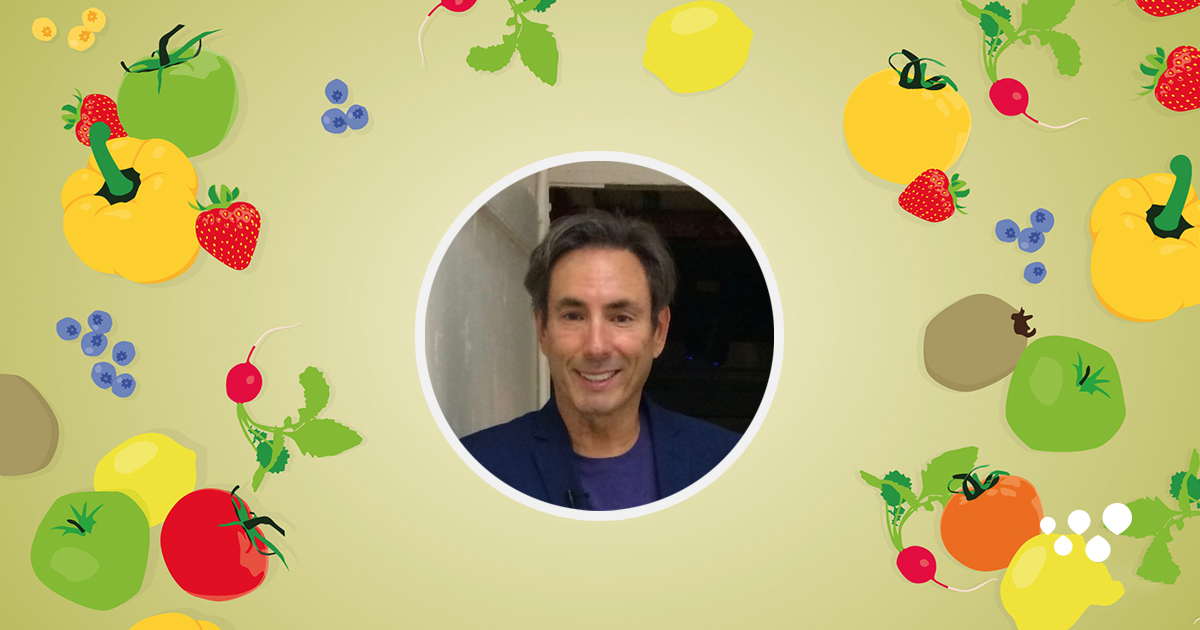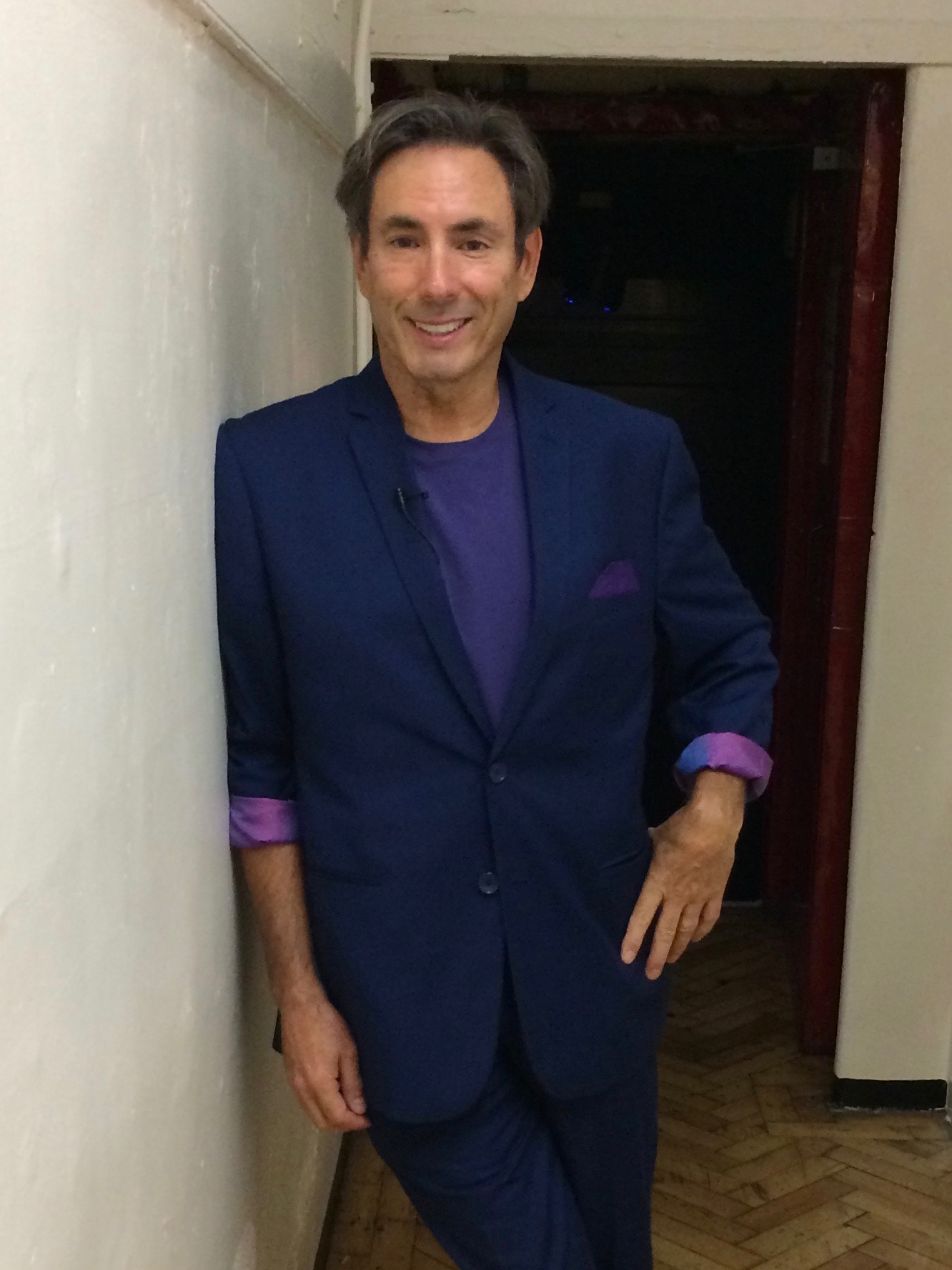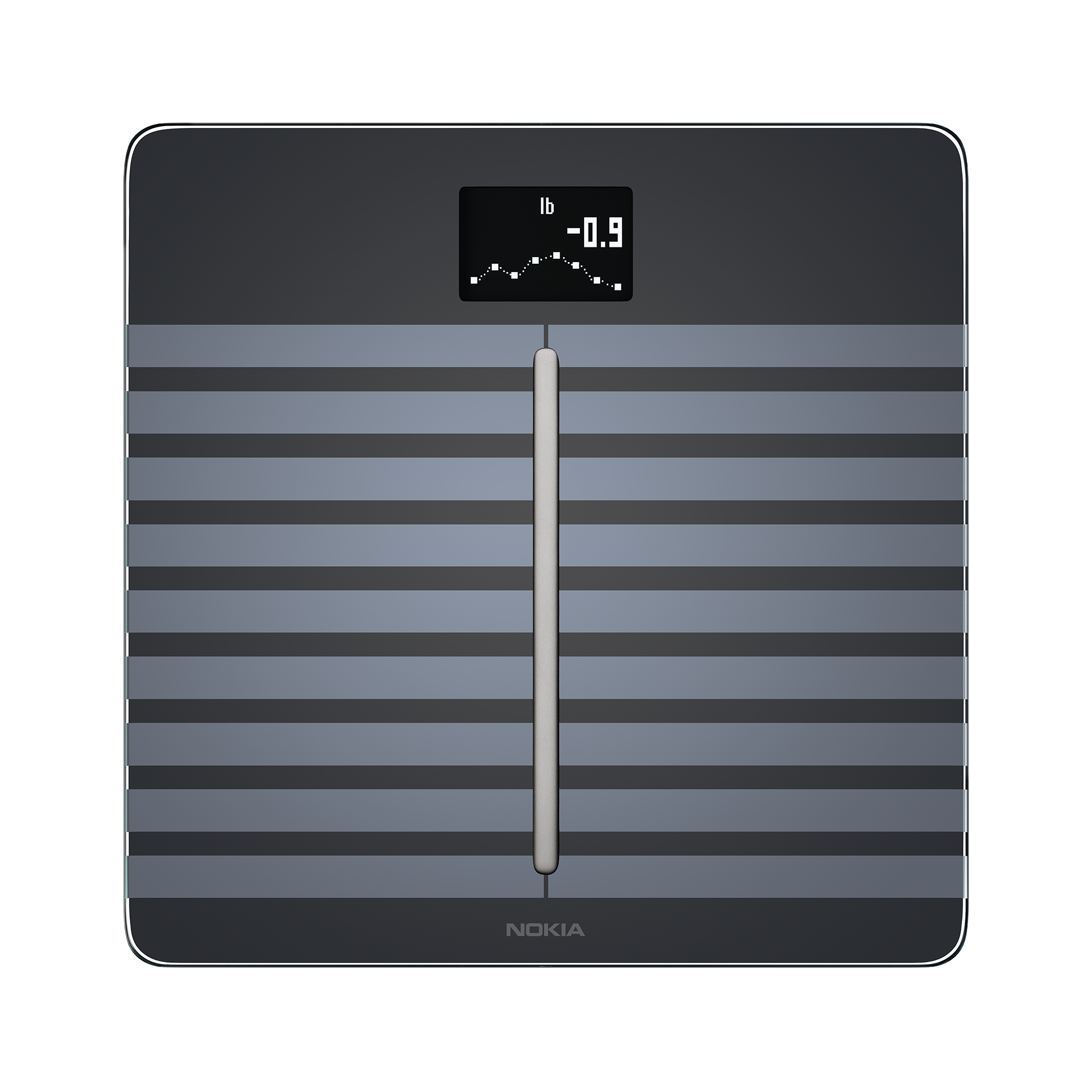
In 2015, comedian, writer, producer, juggler and entrepreneur Michael Goudeau joined fellow performers Penn Jillette and Matt Donnelly on a weight-loss journey. Together, the three friends dropped a combined 240 pounds. Read on to find out how Goudeau changed his relationship with food, tracked his progress, and what advice he has for anyone attempting to do the same.

It’s pretty hard to pigeonhole Michael Goudeau, 56, as any one particular thing. His Wikipedia profile introduces him as a juggler and ex-circus clown who graduated from The Ringling Brothers and Barnum & Bailey Clown College. His website, mikegoudeau.com, highlights his fame as a Las Vegas comic who’s shared the stage with eclectic performers ranging from The Smothers Brothers to Lyle Lovett. He’s also published a book called Extreme Pancakes, and is the entrepreneur behind BBQ Zoo, purveyor of the grill covers he designs. He’s husband to wife Theresa, and dad to Joseph, 16, and Emily, 14, whom the couple homeschool to allow the kids to join travel abroad for Goudeau’s touring shows to places such as Belgium, England, and Kuala Lampur.
For most of his life, Goudeau thought he had a “good relationship with food,” considering himself a pretty healthy cook. “I somehow was ignoring the detail that everyone in my family was overweight by a lot.” When his friend and fellow performer, world-famous illusionist Penn Jillette of Penn & Teller fame, came face-to-face with a health ultimatum and chose to address his own approach to food, Goudeau went along for the ride, following a plan proposed by scientist and TED talks personality Ray Cronise whom the comics, along with fellow Penn’s Sunday School co-host and weight-loss success story Matt Donnelly, affectionately call “Cray Ray.”
Here’s the story of how he went from resistant, to downright skeptical, to willing to embrace an entirely different relationship with food and weight-tracking that led not only himself, but also his family, to a slimmed-down and health-positive lifestyle.
Withings: First off, Michael, thank you so much for taking the time to talk to us. Can you share how you got to know Penn Jillette?
Goudeau: In 1979, I was doing juggling shows on the street in San Francisco. Penn was part of a show called Asparagus Valley Cultural Society and I bought a ticket and went to the show. The juggling and magic community is pretty small, so after the show I went up to Penn and introduced myself as a local juggler. He shouted to Teller, “This guy says he’s a juggler. I don’t believe him. He’s not dressed like a hippie.” Every couple of years for the next 20 years I’d see his show and we’d talk a little afterwards. In 1983, I got a big gig in Las Vegas. Then Penn and Teller started working Vegas a few weeks per year, and we started hanging out a little more and became friends. In 1998 Penn and Teller landed a TV show called Penn & Teller’s Sin City Spectacular. They asked all of their friends to come in for a week to work on the show trying to generate ideas. At the end of the week, I was having a great time and didn’t go home. They let me stay on as a consultant and writer.
What’s the most rewarding collaboration you’ve had with Penn?
Penn and Teller started a TV show on Showtime called, Penn & Teller: Bullshit! I was hired as a writer on that show. It’s a show that matters to me. I’m writing comedy but fighting bullshit. Our job was telling the real science and stories behind things like people who claim to talk to the dead or the anti-vaccine movement.
Are you more a juggler or a writer?
I’ve always considered juggling as an excuse to get up and be funny. I like juggling but I love comedy. The writing is more important to me.
Did you ever consider a career in something other than juggling and performing?
My plan all along has been to become a forest ranger. I hope someday to succeed in that goal. Anyone looking for a forest ranger that can do a pretty funny juggling show and has a fascination with nature? I could do a really great fireside show.
I see you were born in Louisiana. Do you consider yourself a southerner, or was that a fluke of geography?
I love Louisiana. I have what I consider to be residual Cajun in me. I love the food. I love the swamp. I love to go fishing. I love to catch snakes. My parents wanted to be hippies. They moved to California in 1968 to be close to Haight-Ashbury. If they hadn’t moved maybe I’d be a successful forest ranger today.
While busy with a successful Vegas act, you decided to drastically change your relationship with food and eating. Can you tell us about that?
In October of 2014, Penn was in the hospital with out-of-control blood pressure. A few days after he was out of the hospital we were out riding our recumbent tricycles… Yeah, I just said “recumbent trikes,” just in case you didn’t realize what sort of weirdos you’re dealing with… and Penn mentioned that our mutual friend Ray Cronise was in town and had a diet thing he was working on, but that it sounded crazy. The doctors had told Penn he should consider getting gastric sleeve surgery. To Penn, that was the same as saying, “Do whatever the hell crazy thing you want because you’re going to die.” We talked about Ray’s plan and decided to try it.
One of the things Ray kept saying that worried me was, “We’re going to change your relationship with food.” I was skeptical. Not just skeptical, resistant. Food and I had a great relationship. I love food. Food loves me. I’m a good cook. I considered myself a relatively healthy cook. So I started Crazy Ray’s plan. I kept cooking for my family but I changed what I ate. I didn’t talk to them about joining me. I didn’t push anything. In a few weeks they saw that I was losing weight fast. Then I passed my wife’s weight. She jumped on the bus and changed her diet and started losing quickly, too. Once the two of us were eating the same stuff it became easy to start switching over the whole family’s meals to the foods I was now eating. I didn’t do it overnight but I started changing a few meals per week. We’re not skinny yet, but without much effort, my children have lost significant amounts of weight.
Do you and your wife share similar goals about fitness, eating, and activity? Is this a personal or group journey?
I think almost everyone on earth has similar goals. We all want to be healthy and feel good. We all have different ideas about how to achieve that. My wife and I now have a cohesive plan and work in that direction. We still have pizza sometimes but we’re finding it less and less appealing. I would never have expected that. Our process is only a year old so it’s still evolving. Our tastes are changing in unexpected ways.
Your Wiki entry calls out that your children are adopted. Would you like to share anything about being a dad through adoption?
Adoption has been an amazing part of my life. My wife and I had health problems that precluded us having children. We have open adoptions, and that means that our children know their biological families. That was an incredibly scary thing to do at first, but it’s been a fantastic gift. My children know their siblings and their medical history. My wife and I now have friends who’ve given us the best gift imaginable. The process of adoption is pretty invasive. It’s a tax audit, a physical exam, and a psych evaluation, and then you go meet a woman who is thinking about choosing you to raise the baby she’s about to have. It’s intense. My story is anecdotal. It’s not science, but my feeling on the “nature vs. nurture” part of weight leans towards nurture. I’ve got a genetically diverse family. I feed them. They were pretty overweight.
You seem like a fairly cerebral guy. Does intellect have any bearing on deciding to take your health into your hands?
Being healthy doesn’t seem to be related to anything cerebral. I feel like it’s a different part of your brain. It wasn’t being smart that motivated me to lose weight, but I did take the advice of smart people. Ray is smart. He, and lot of others are working on the science. That takes some brains. They’re really examining the giant, screwed-up pile of diet stuff that’s out in the world right now. That world is a mess. Diet information is mighty close to religious beliefs. If you have the nerve to say, “My study suggests eating only gummy bears is not a viable diet,” some people will shout that you’re a heretic and should be put to death. The Gummy Bear Advisory Board will attack your credentials and have you fired from your job. The Gummy Worm Advisory Board will say, “We’re not the same as gummy bears. Our studies suggest if you eat only gummy worms you can fly.” Ray and others are examining the very basic diet assumptions and trying to establish a true science-based diet.
Are performers generally fit and healthy? Why or why not?
I think as a group, performers are generally thin. I don’t think they’re particularly healthy. Most of us performers have an idea that how we look affects our work but looking thin and being healthy are pretty different. There are a lot of dancers who eat only French fries.
The kind of act you do must be hard on the body. What do you do, if anything, to maintain your health?
I ride a six-foot tall unicycle in my act. I’ve had both hips replaced. I juggle a bowling ball, a chainsaw, and a torch, and that has lead to a long relationship with tendonitis in my elbows. When I’m in a full-time show, I don’t really need to do any juggling training because I get enough during the show to maintain my skills. When I’m not doing a lot of shows I juggle for a few minutes every day.
Do you use any devices to help with weight loss and maintenance? If so, which ones?
Before Ray Cronise would let Penn and I start on his plan, he insisted that we buy Withings scales. I didn’t understand why. It seemed like the least important detail. I couldn’t have been more wrong. He wanted to track our progress, and knew that the Withings scales offered more than a place to check our weight. It’s a real motivational tool. I love the scale and the walking-tracker part of the app. I don’t have to do anything but pull out my phone to realize that I need a few laps around the neighborhood to make the level of exercise I want to get to that day. During my weight loss, I LOVED the graphing feature. It feels amazing to see that line on the graph diving. Also, when friends of mine decide to follow Ray’s advice, I ask them to add me to the list of people the scale sends updates to. It’s great to be able to see when they’re successful, and email them encouragement.
Have you tried any diets, fitness devices or routines that didn’t work for you?
I’ve done a few diets, and they all seem to work for a short time. They didn’t stick. I’ve tried exercise, and the reality seems to be that you can’t outrun your mouth. We are super-efficient machines, and don’t use much energy even when working hard. One year, I decided to ride my stationary bike the same amount of time the Tour de France riders were on their bikes. Every day, I’d ride the same amount of time as the winner of each stage. It’s many hours. I made no attempt to ride fast or hard, just as long. I didn’t change my diet but at the end of the 21 days of riding, I had lost about 1 pound for every 9 hours of biking.
You are clearly a Renaissance man. I love “Extreme Pancakes.” Also, I looked at your BBQ covers. If you were so rich you didn’t have to worry about money, how would you spend your time?
Being a professional juggler means you get a lot of free time. It’s an amazing gift. I get to spend a lot of time with my family and doing fun things. That leads to pancakes.
I wrote “the book” on pancakes. It’s not a recipe book, but a method for making pictures with pancakes. It was published by Barnes & Noble, and it’s sold out, and I don’t think they’re going to print more. The best part is that I feel like I started an explosion in pancake art. I’m not good at drawing, but people saw my pancakes and method I used to create them. Real artists grabbed on and made it fantastic. There’s even an electric pancake printer now based on the basic idea I had of drawing pancakes with a ketchup bottle. You can see some of my pancakes at thepancakeproject.com.
I also make and sell funny barbecue covers. It’s hard to explain why I do it. I thought that this would be a fantastic idea, and I’d be fabulously wealthy. I sell a few a month. I’m really Ralph Kramden.
If I had the financial means I’d be an explorer. I love travel. I’d buy a sailing catamaran, and head out with a pile of GoPro cameras, and start a YouTube channel of my adventures as a juggler sailing the world, meeting people, seeing the wildlife, and doing goofy comedy shows.
Would you like to share any recipes?
Today I was experimenting with making uncooked applesauce. I tossed two pounds of peeled and cored apples, a banana, and a teaspoon of cinnamon into a food processor. I tried all four of the different apple varieties they had at my local store to see which would be best. The taste test revealed that everyone in my family has a different favorite apple. Everyone liked a different one best. Try it with your favorite apple.
Do you have health and fitness advice for the common person? Top tips for easy or not-so-easy success?
The most important rule in Diet Club is don’t talk about Diet Club. Everyone has heard some incredibly stupid diet study and will have advice for you. “I saw that an all hot chocolate and whipped cream diet is how the Aztecs stayed so slim.” Everyone thinks they know what you should be eating. Everyone will tell you what you’re doing is stupid, and that you should do what they’re doing. The best way to avoid this is don’t tell them you’re doing anything. When someone says, “Are you losing weight?” you say, “I’ve got a touch of the black plague or something.”
We [Penn, Matt and I] lost weight as fast as anyone on “The Biggest Loser.” And there was no screaming, crying, sweating, or injury.
You lose weight right now. You can’t eat something now and decide to skip something later. Skip it now or it will never happen.
***
Want to know more? Follow Michael Goudeau on Twitter @damnedjuggler




